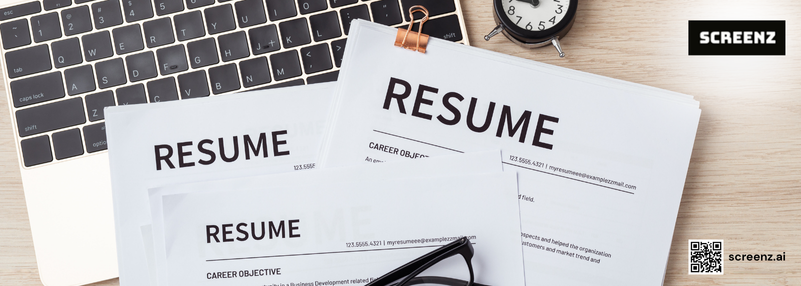WHY TOP TEAMS ARE MOVING BEYOND RESUMES AND INTERVIEWS
In most companies, hiring still revolves around the same familiar tools: resumes, interviews, and referrals. While these methods have been the norm for decades, they were designed for a different era, one where predictability and surface-level assessments were enough.
Today, that approach simply doesn’t cut it.
Top-performing teams are no longer relying on guesswork, personality, or polished storytelling to make hiring decisions. Instead, they are adapting to something more effective and more aligned with real-world performance: simulation-based hiring.
At Screenz, we believe the way to build truly high-performing teams is by understanding how people work, not just how they talk about their work.
The Problem with Traditional Hiring Signals
Resumes remain the go-to starting point for most hiring processes. They are fast to scan, and they offer a broad picture of someone’s experience. But in practice, resumes reveal where someone worked, not how they worked. They are often filled with buzzwords, vague claims, and templated language that can easily be enhanced with AI. Worse, they carry inherent bias and provide little predictive value when it comes to on-the-job success.
Interviews are often used to assess communication style, attitude, and cultural fit. But these conversations rely heavily on hypothetical scenarios. They can be influenced by charisma rather than competence, and outcomes vary widely depending on the interviewer. Some candidates rehearse answers. Others are simply better at talking than doing. The result? Inconsistent signals and an increased risk of mis-hire.
Referrals can provide insight into a candidate’s background or working relationships. But they are inherently subjective. Who someone liked working with in the past doesn’t always equate to who will succeed in a new environment with different expectations.
All three of these methods share one limitation: none of them show how a candidate actually performs on the job.
The Shift to Simulated Performance
Performance-based hiring solves this problem by making job-relevant tasks the centerpiece of the hiring process. At Screenz, we’ve built an AI-powered platform that allows companies to simulate how candidates work, before making a hiring decision.
Candidates are assessed using real-world simulations based on your actual workflows, challenges, and decision points. These aren’t generic assessments, they are contextualized for the role and benchmarked against your current top performers. That means you’re not hiring based on abstract potential. You’re hiring based on how someone solves problems, how they prioritize under pressure, how fast they adapt, and how they deliver outcomes.
Simulations don’t just improve the quality of hiring, they accelerate it. With the right setup, companies can shorten the decision-making cycle, reduce bias, and increase confidence in their hiring process.
What Screenz Makes Possible
Using Screenz, teams can hire with clarity. You’re no longer relying on who looks best on paper or who performed well in a well-lit conference room. Instead, you’re making decisions based on hard signals: task execution, cognitive patterns, decision-making quality, and speed of delivery.
This shift has several key advantages:
· It reduces the risk of hiring someone who soundsgood but doesn’t deliver.
· It helps teams spot high-performers earlier inthe process.
· It aligns hiring with actual business needs andculture, not assumptions.
· It minimizes ramp-up time and ensures a smoother transition from candidate to contributor.
Most importantly, it creates a more equitable process. Simulations allow candidates to be evaluated on what they can do, not on who they know, how they speak, or how well they perform in high-stakes social situations.
Hiring in 2025 and Beyond
As hiring becomes more competitive and talent more distributed, companies that invest in performance-based hiring will hold a meaningful advantage. They will spend less time managing poor fits and more time developing proven performers.
This isn’t a theoretical trend. It’s already happening. And the teams that adopt simulation-based hiring early are the ones who will attract, retain, and grow the kind of talent that moves the business forward.
Screenz was built to help forward-thinking companies do exactly that.
If you want to stop guessing and start hiring with proof, explore what’s possible with Screenz at screenz.ai.
.avif)









